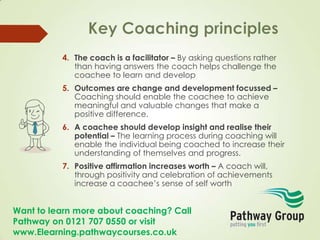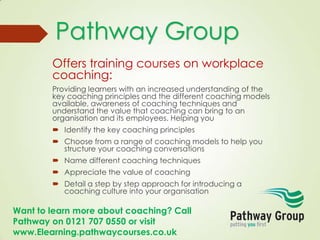What is Workplace Coaching and why you should implement it?
- 2. Want to learn more about coaching? Call Pathway on 0121 707 0550 or visit www.Elearning.pathwaycourses.co.uk
- 3. Want to learn more about coaching? Call Pathway on 0121 707 0550 or visit www.Elearning.pathwaycourses.co.uk What does Workplace coaching look like? Generally one-to-one Targeted at personal development The person being coached gains awareness and insight Focused on helping the individual achieve specific goals and is directed towards action The coaching discussion is based on the coachee’s agenda and needs, not the coach’s It requires an honest and open relationship between the coach and the coachee
- 4. Want to learn more about coaching? Call Pathway on 0121 707 0550 or visit www.Elearning.pathwaycourses.co.uk Coaching has personal development at its core. So not only is it able to drive forward business objectives but does this by creating greater personal worth and quality from the individuals being coached. This creates greater capability for improved individual and organisational performance in the future.
- 5. Want to learn more about coaching? Call Pathway on 0121 707 0550 or visit www.Elearning.pathwaycourses.co.uk Why implement workplace coaching? Individual benefits Clear goals and objectives Increased motivation and commitment Improved decision making Enhanced self-awareness Greater flexibility Increased self-confidence Ability to work independently A greater sense of responsibility for their own actions and results
- 6. Want to learn more about coaching? Call Pathway on 0121 707 0550 or visit www.Elearning.pathwaycourses.co.uk Why implement workplace coaching Business benefits: A more motivated and productive workforce which is constantly learning and improving
- 7. Want to learn more about coaching? Call Pathway on 0121 707 0550 or visit www.Elearning.pathwaycourses.co.uk 1. Coaching is a learning partnership – Effective coaching will be about the coach and the individual learning together and that driving change and action 2. Coaching is done in the context of work – and the coach needs to have an understanding of this work context, while also appreciating the person overall. 3. The coachee sets the agenda – Unless the person being coached defines the agenda for the coaching it is unlikely to be successful.
- 8. Want to learn more about coaching? Call Pathway on 0121 707 0550 or visit www.Elearning.pathwaycourses.co.uk 4. The coach is a facilitator – By asking questions rather than having answers the coach helps challenge the coachee to learn and develop 5. Outcomes are change and development focussed – Coaching should enable the coachee to achieve meaningful and valuable changes that make a positive difference. 6. A coachee should develop insight and realise their potential – The learning process during coaching will enable the individual being coached to increase their understanding of themselves and progress. 7. Positive affirmation increases worth – A coach will, through positivity and celebration of achievements increase a coachee’s sense of self worth
- 9. Want to learn more about coaching? Call Pathway on 0121 707 0550 or visit www.Elearning.pathwaycourses.co.uk
- 10. Want to learn more about coaching? Call Pathway on 0121 707 0550 or visit www.Elearning.pathwaycourses.co.uk Sir John Whitmore sets out a coaching model designed to grow people, performance and purpose. The model demands that the coach has effective questioning and active listening skills. GOALS – What do you want to achieve? REALITY – What is the current status/what have you achieved? OPTIONS – What are the routes available? WILL – What will you do?
- 11. Want to learn more about coaching? Call Pathway on 0121 707 0550 or visit www.Elearning.pathwaycourses.co.uk Contracting: establishing the desired outcomes, and agreeing the rules. Listening: Using active listening and interventions to develop understanding and create personal awareness. Exploring: Helping the coachee to understand the personal impact the situation is having on themselves, then challenging the coachee to think through possibilities for future action in resolving the situation. Action: Supporting the coachee in choosing a way ahead and deciding the next step. Review: Closing the intervention, reinforcing areas covered, decisions made and value added. The coach should also encourages feedback from the client
- 12. Want to learn more about coaching? Call Pathway on 0121 707 0550 or visit www.Elearning.pathwaycourses.co.uk OSKAR is a framework for solution focused coaching, driven by: finding out what works and doing more of it stopping doing what doesn't work and doing something else 1. OUTCOME: What is the objective of this coaching? What do you want to achieve today? 2. SCALING: On a scale of 0 to 10, with 0 representing the worst it has ever been and 10 the preferred future, where would you put the situation today? You are at point ‘x’ now; what did you do to get this far? How would you know you had got to ‘x’+1?
- 13. Want to learn more about coaching? Call Pathway on 0121 707 0550 or visit www.Elearning.pathwaycourses.co.uk 3. KNOW-HOW & RESOURCES: What helps you perform at x on the scale, rather than 0? When does the outcome already happen for you, even a little bit? What did you did to make that happen? How did you do that? 4. AFFIRM AND ACTION: What's already going well? What is the next small step? You are at x now, what would it take to get you to x+1? 5. REVIEW: What's better? What did you do that made the change happen? What effects have the changes had? What do you think will change next?
- 14. Want to learn more about coaching? Call Pathway on 0121 707 0550 or visit www.Elearning.pathwaycourses.co.uk Frame the conversation -- Agree on purpose, process, and desired outcomes of the discussion. Understand the current state -- Explore the current state from the coachee's point of view, expanding his or her awareness of the situation to determine the real coaching issue. Explore the desired state -- Articulate the vision of success and explore multiple paths before prioritising ways to achieving the desired state. Lay out a success plan -- Identify the specific, time- bound action steps to be taken to achieve the desired results, and determine milestones
- 15. Want to learn more about coaching? Call Pathway on 0121 707 0550 or visit www.Elearning.pathwaycourses.co.uk
- 16. Want to learn more about coaching? Call Pathway on 0121 707 0550 or visit www.Elearning.pathwaycourses.co.uk Coaching vs. management is a significant shift in mind set for business leaders and managers Openness and honesty which are fundamental can be challenging in manager to staff context Following the coachee’s agenda can be difficult if a business has certain goals and objectives Deciding between internal an external coaches is difficult Coaching takes real skill and commitment
- 17. Want to learn more about coaching? Call Pathway on 0121 707 0550 or visit www.Elearning.pathwaycourses.co.uk Buy in from the top –Nothing will diminish the impact of implementing coaching more than key leaders in the business, not committing to coaching themselves. To create understanding – Everyone involved needs to understand why coaching is being implemented, what coaching is and how both coaches and coachees can expect to benefit from coaching To choose training providers carefully – Whoever is going to train leaders and managers in your business to coach, they need to have a track record, be coaches themselves, and offer ongoing support to your business
- 18. Want to learn more about coaching? Call Pathway on 0121 707 0550 or visit www.Elearning.pathwaycourses.co.uk Motivation to coach – Managers need to be targeted on their coaching, both on how much time is spent coaching and also the feedback on the quality of their coaching Set targets – Qualitative and quantitative measures need to be in place in order to evaluate the success of coaching in the business Give it time – Coaching is not an overnight fix, but a medium to long term investment in the growth of your staff and therefore your business. Implementation of coaching into your business could take between 6 months and year. The benefits can be significant, but there will be an investment in time.
- 19. Want to learn more about coaching? Call Pathway on 0121 707 0550 or visit www.Elearning.pathwaycourses.co.uk Offers training courses on workplace coaching: Providing learners with an increased understanding of the key coaching principles and the different coaching models available, awareness of coaching techniques and understand the value that coaching can bring to an organisation and its employees. Helping you Identify the key coaching principles Choose from a range of coaching models to help you structure your coaching conversations Name different coaching techniques Appreciate the value of coaching Detail a step by step approach for introducing a coaching culture into your organisation Pathway Group


















